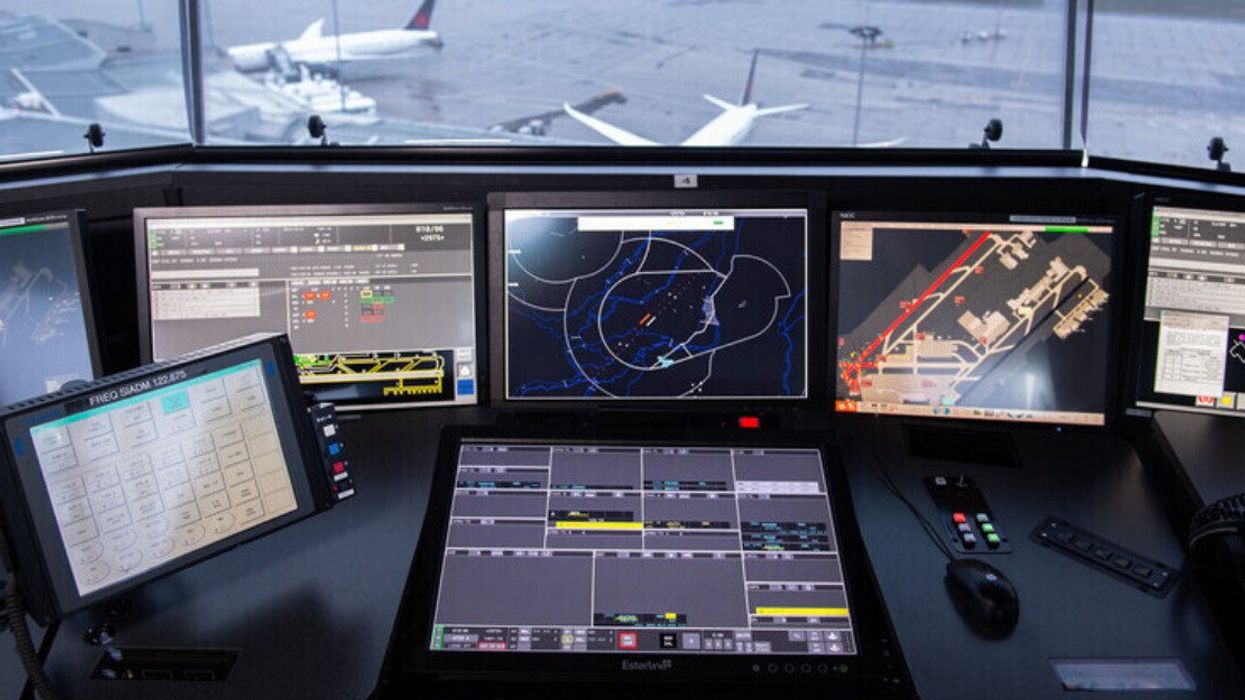NAV Canada Is Hiring Air Traffic Controllers & You Can Make Up To $170K With No Experience
A former Air Traffic Controller spoke about the career and application process.

The desk of an Air Traffic Controller at NAV Canada.
If you're looking for a high-paying job in Canada that you don't need a degree to qualify for, you might want to consider becoming an Air Traffic Controller.
NAV Canada is currently hiring for the roles of Flight Service Specialist and Air Traffic Controller and, while the application process for these jobs is notoriously competitive, a degree is not required.
On top of that, an Air Traffic Controller's salary in Canada can get up to $170,000 a year.
But, don't be fooled into thinking it's all sunshine and roses, because there's a lot to consider if you're thinking this career might be for you, including relocation, shift work, a long training period, and work-related stress.
So, what exactly does it take and how can you become an Air Traffic Controller in Canada?
Narcity spoke with a former NAV Canada Air Traffic Controller, Diana Kelly, who is now the corporation's Vice President and Chief Human Resources Officer, to hear about her journey and what can make you a strong candidate if you're considering this career.
How can I become an air traffic controller in Canada?

An air traffic control tower at Billy Bishop Airport in Toronto, ON.
"We're really looking for people that are quick decision makers. People that can handle pressure," Kelly told Narcity. "They can process a lot of information cognitively ... [and] you need to be able to visualize where airplanes are. You have to have good spatial reasoning skills."
Other key qualities listed include having sharp judgement, strong motivation, a good memory, and excellent problem-solving abilities. The reality is the nature of these skills may not lend themselves to any prior job experience in particular.
In its job application, NAV Canada describes a career in Air Traffic Services as, "anything but ordinary." The recruitment and training process is "rigorous and highly competitive," while the job itself is described as "both challenging and rewarding."
"Our application process is really about assessing aptitude for the position," Kelly said. "We're looking for that aptitude and then we do all the training. So there isn't any certain background that we're looking for at all."
In her personal case, Kelly told Narcity she applied to become an Air Traffic Controller years ago while studying to become a German immersion elementary school teacher.
Aside from the skills and personality traits mentioned above, NAV Canada does require candidates to be 18 years or older, have a high school diploma, and be a Canadian citizen or permanent resident.
You must also be willing to relocate. Flight Service Specialists provide timely information to arriving and departing aircraft and work out of Flight Service Stations located in 55 different (mostly remote) communities across Canada.
Air Traffic Controllers coordinate the flow of air traffic from Control Towers and Area Control Centres across Canada, with 42 control towers located across Canada's airports and seven Area Control Centres, which are located in Vancouver, Edmonton, Winnipeg, Toronto, Montreal, Moncton, and Gander.
How much are air traffic controllers paid in Canada?
While the exact dollar figure depends on the position you're applying for, all of these positions in air traffic control services are high-paying jobs.
"It's a job with a tremendous amount of responsibility, and the compensation reflects that," Kelly told Narcity.
A certified flight service specialist at NAV Canada can make anywhere between $68,464 and $104,811, depending on whether you're working at a Flight Service Station or Flight Information Centre.
As a certified Area Controller, the starting salary is $116,106 and goes up to $170,241 per year. A certified Tower Controller has a starting salary of $84,347 and can make up to $170,241 annually.
Kelly explained on top of the base salary, the round-the-clock, shift-work environment often leads to opportunities for employees to work overtime.
How long does it take to become an air traffic controller in Canada?

An Air Traffic Controller working.
Alongside being an incredibly competitive application process, one of the downsides of a career in air traffic control services can be training.
Not only does training take a long time, but you also don't start earning the salaries mentioned above until you're fully certified.
The average length of the training process to become a certified Flight Service Specialist can be up to 11 months, and during that time, you make a maximum salary of $42,504.
Tower Controllers typically train for 10 to 18 months and Area Controllers are in training the longest, between 20 and 27 months. For both of those roles, training pay reaches a maximum salary of $49,622.
Kelly described the training process to become an Air Traffic Controller with NAV Canada as one of the most stressful parts of the job, "because you really want it right? You're invested when you're training and you want to be successful," she said.
Is being an air traffic controller a stressful job?
In short, the answer is yes. But contrary to what people may think, the job of an Air Traffic Controller isn't stressful all of the time.
"There are certainly times of stress, Kelly explained. "That's why we're looking for people who can operate well under pressure. They can make decisions in intense situations. But the day-to-day is not stressful."
Despite that, Kelly did say some of her favourite aspects of the job were the "adrenaline" and the "responsibility."
"There are still moments that can become very intense, and that's when they work in teams, [why] they have that training, they have that ability to deal with pressure."
But on the flip side, Kelly explained the on-the-job responsibility provides a welcome perk that is often overlooked.
"When you unplug and go home if you have two days off — there's no emails, there's no follow-up. That is lovely!" she exclaimed. "You get your time off when you're off."
If you're thinking about trying to become an Air Traffic Controller in Canada, NAV Canada's Vice President and Chief Human Resources Officer encourages you to simply apply.
"Do the basic online application for NAV Canada," Kelly said."It's quick. It's easy to do and you don't know, it may lead to the next steps of the assessment process."
For anyone on the fence about it, "put some research into learning about the profession," she said. "We have lots of information on our website."
And hopefully, this article gave you some more insight into just what it's like and what it takes to become an Air Traffic Controller in Canada, too.
This article's cover image was used for illustrative purposes only.
This interview has been condensed and edited for clarity.